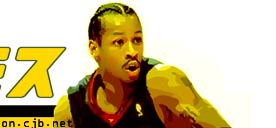





| Things Done Change |
|---|
|
The Eastern Conference championship is still fresh, the MVP trophies still gleam. You might look at No. 3 differently now, you might think he flipped, but make no mistake -- Allen Iverson is still the same person he's always been. "I don't know/What this world's gonna do/But I know one thing/That this is the life of me..." Could it be his baggy shorts or his tat'd neck that makes him different than y'all? Or is that what made him King? There is a soundtrack to this man's life. It's concrete driven, on 22s. You've heard it before, every time y'all sneak into Rucker Park, hoping to see Bad Boy play Loud Records or maybe get a glimpse of Hot Sauce vs. Headache. You hear Escalades and Navis glide by. Jadakiss, Cormega or Fabolous. You can't deny it. Then you escape before it gets black, back up to the Hamptons to tell your friends. You get hooked on the bezels and the Bentleys. The Grant Hill jersey is an afterthought now, Mitchell & Ness has your new order: PHILA 3. But you still don't know what "Cru Thik" means. Still, Moms and Pops are getting concerned. They're noticing changes. It's too late. Guess who's coming to dinner? "Thug it like that/My whole crew rugged like that/Getting' money in the ghetto 'cause I love it like that/Now, that's gangsta..." The soundtrack continues. A bad boy's saga. No one has been able to do this. Especially with darkness making up their skin tone. It is here, at this point, where most others flip. Switch. Cross over. Sell out. Cut their 'rows for White America, airbrush the tats for Madison Avenue, change the people around them. For five years, the world waited. Waited to see when he was going to fold. They've seen this before, "niggers" like him coming into their living rooms, onto the walls of their children's bedrooms, signature sneaks and $150 jerseys in their closets. They've dealt with the infiltration. Like Jordan, the defiant years: Double gold ropes, Kool Moe Dee in the headphones, non-white kicks on the feet, etc. Then come the subtle shifts: McDonald's and Gatorade ads, golf, Chevy rides, Fresh Prince instead of KRS. America falls in love. And Ice Cube's "They'll find another..." lyric comes home. For this one though, the one who rocks the bandanas and wife-beaters on his off days, there was a resistance they hadn't seen before. "We'll get him, too," they'd say. And for him, they were willing to wait it out because deep down, they knew he wanted their acceptance, their embrace, their money. But they ain't know him. Year One, Year Two, Year ThreeŠ Nothing. No change. American frustration sets in. "Mommy, I want my hair like Iverson's," they'd yell, already rocking the bandanas and white tees. Mommy's internal response: "I'll be glad when that damn Allen Iverson grows up." That's how they'd put it. "Grow up," meaning: be less ghetto, be less scary, be less black. Year Four, Year Five. Mommy is still waiting. "E'rybody got a story/We all ghetto, B/Here's mine/See I was born in sewage..." It would be nice to sit here and write that we told you so, America. Of course, that would be condescending, unethical...but fuck it, we did. We did it in '96, making him the first non-NBA player to ever bless the cover of this magazine; giving him his first national media cover, period. We did it again in '97, right after he won the Rookie Game MVP and the NBA put a "gag order" on his media privileges. 1998. 1999. Now, Cover Five. We exalted him to Jay-Z status, simply because, unlike the rest of America, there was no reasonable doubt in our minds that he was going to become a one-man dynasty like no other. What we didn't know was that the rest of the country would see past the glaciers of ice and give AI love. He suddenly began poppin' up on the covers of magazines that had previously wanted nothing to do with him, or, if they did, called him "basketball's Mike Tyson." All of a sudden his "image" wasn't threatening, it was "marketable." They started to accept him as he was. They knew there was money to be made off him. They started listening to the soundtrack. "And I/Get chains/And I/Get brains/And I/Sit sic in the 4.6/And we/Get low/And we/Get dough/And we/Cold D so now the streets know..." While leading the League in scoring, he'd make a comment that would start to change the perception. "I'd rather have more heart than talent any day." That would become his m.o., his "I Have A Dream" statement, his definition. With a fucked-up shoulder, broken toe, sprained right elbow and chip fracture in his left ankle, etc., etc., the walls of hate started coming down. The SI cover: "Allen Iverson. Not As Bad As You Think." The John Q. Publics began to understand. So by the time ESPN The Magazine jumped on late last season, the Iverson Bandwagon was already sitting on chrome. "Triple-beam playas/Schemin' for the cream playas/Them mean playas/Them million-dollar-dream playas/Made playas/Them never-be-a- slave playas/Them out-here- getting-paid playas..." There was blood everywhere. Hemorrhaging. But he kept it hidden. He did things that way. Survival tactics. Instinctively, he swallowed. As the blood accumulated inside his mouth, he did just that: he swallowed it. When it became too much to digest, he'd simply stick his face inside his jersey as if he was wiping the fourth-quarter sweat from his brow, and he'd spit, watching ounces of blood run down his chest. This was his way of hiding it. This was the only way he could keep the referees from knowing what was really going on. For if they knew, by law, they'd remove him from the game. And by his law, with less than two minutes left and his team down by a point, not being on the court was not an option. You may be afraid to admit it, but this is really why you fell in love with him. His head was light as the clock wound down, but somehow he'd muster a way to create illness on the court. Flipping a running one-handed, half-finger-roll off the glass and over the extended arms of two Milwaukee Bucks players, his 10th and 11th of his team's last 13 points in that quarter. They'd win by six, tie the series, and go on to win two of the next three games to reach the NBA Finals. Afterward -- after swallowing the last bit of blood he could, after diplomatically telling the media (something you think he wouldn't have done in the past) that the foul that caused him to bleed this way was not, he "hoped," intentional; after admitting he probably shouldn't have played because of the pain he had to endure due to a tailbone bruise that kept him out of the previous game; and before getting on the team bus with wife-to-be and kids, who kept asking if he's alright -- he looked down at the reporter he had his arm around and said, "They tried to knock my muthafuckin' tooth out!" This, America, is the future of the NBA. Whether you hate it or live to hate it more. The last impression the country had of Allen Iverson was of him leaving the court after Game 5 in the NBA Finals and not saying anything to anybody. Right in the middle of this new lovefest with Amerikkka, AI did a Detroit Piston move and, as one Laker fan would say, "showed 'em where he came from." And the soundtrack repeats: "It ain't where you're from, it's where you're at." It has been a summer of content for Iverson -- the exact opposite of the previous offseason. He has been virtually silent since Derek Fisher chased him down the hallway of the First Union Center to give him some post-elimination love. "That whole thing was nothing personal," he says. "Actually, we were told before the game, that if the [the Lakers] win, leave the court because of the celebration. I didn't mean anything by walking off." He's gotten married, made appearances at charity events (Stephon's and Donovan McNabb's), had his own charity softball game, built up the website, changed his diet, hit crazy weights, worked out with his personal strength and conditioning coach daily, let the old injuries heal, kicked it less‹and barely touched a basketball. That's where AI is at right now. But for some, it's always and only going to be about where he's from. It's a hurdle that many people in this land of the free, home of the slave, simply cannot get past. The reality that he's become the future -- not just of basketball, not just of sports, but of what every kid who doesn't feel Tiger Woods wants to become -- is frightening. And the fact that, in just five years, he's taken his team to the highest stage, indicating that: 1) he's not about to fall off anytime soon; and 2) he has to be dealt with on his own terms. It turns dinner at the Simpson's (OJ or Homer, you choose) into a scene even HBO would be hesitant to air. "If you ain't ever been to the ghetto/Don't ever come to the ghetto/Because you ain't understand the ghetto/So stay the fuck out of the ghetto..." That was the cry of happiness heard from a few Fubu Platinum-dipped brothas at the F.U. Center as the Sixers clinched the Finals. Their direct reference was to Iverson's continued cocking of his cap, and the ghetto fabulousness that came with it. This is where you knew he was never going to change, that too much pride and "I-told-y'all-muthafuckas-so" attitude had set in. Unfit for Middle America's comfort zone, AI made sure, in the midst of the postgame bedlam, that his newly minted Eastern Conference Champions cap was twisted correctly. No one void of black skin would realize the significance of his attention to detail at that moment, but for the society of blacks -- especially young black men -- his unapologetic gesture, repping the KING culture, meant everything. Label it thug passion if you will, but it wasn't Alizé and Hennessy. Don't get this new life of his twisted. If you think Allen Iverson is no longer hated, you're a fraud. Scalp yourself into a basketball game outside of Philadelphia and listen. Closely. Go to Conseco Fieldhouse in Indy, the Bradley Center in Milwaukee or the Garden in NYC. Sit behind the necks of red, sit behind the brothers of Brooks suits, sit behind press row. When you hear the words "monkey," "jailbird," "thug," "gangster" and "nigger," don't act surprised. It's normal. See, they don't like the future. And they're upset that they can't stop it. AI hears them, too. That's why, when the NBA awarded him the MVP trophy for the '00-01 season, he wanted to tell the world to kiss his "narrow, ashy, thugged-out black ass." But, like the curdled blood inside his mouth in Milwaukee, he swallowed that, too. Diplomacy. Instead, he dropped 54 points on the world that night, repeating in his head, after every basket, the labels he'd been given. That game, he would say later, "That was for the haters." |

|
|---|
| Author |
| Scoop Jackson |
| SLAM Magazine |
| Return to Articles |